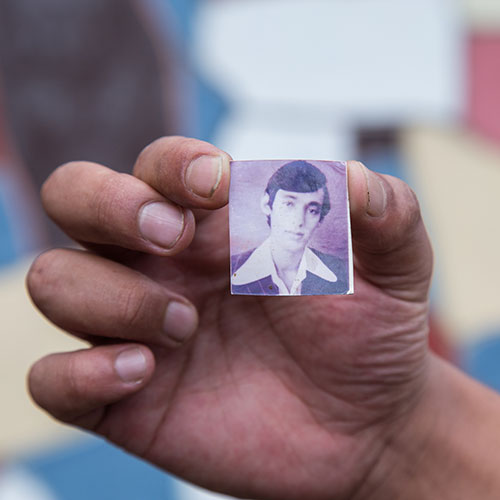School headmaster disappeared in December 2001
FACTS

On 13 December 2001, after answering a request to report to the district’s education office in Okhaldhunga, Chakra Bahadur Katwal, headmaster of a secondary school where he also taught science, was redirected to the district police office for questioning. He was seen carried away by soldiers the following day, seemingly unconscious, his clothes blood-stained and his body showing signs of beating. He was taken into the police building and never seen again.
Read more: here
Procedure
In 2006, Chakra Bahadur Katwal’s family petitioned the Supreme Court, which in 2007 ruled that he had been arbitrarily arrested and detained by Nepalese authorities, and that the torture to which he had been subjected led to his death. The Supreme Court ordered that the persons identified in the inquiry report as involved in the case be prosecuted and punished.
In October 2010, Chakra Bahadur Katwal’s wife, represented by TRIAL, filed an individual complaint with the Human Rights Committee. In 2012, the Human Rights Committee declared the case admissible, clarifying that she did not have to wait until domestic transitional justice mechanisms were in place before filing the case, as these mechanisms – while important tools to establishing the truth – cannot replace criminal prosecution. The Human Rights Committee subsequently decided the case in April 2015.
It found that that Chakra Bahadur Katwal’s deprivation of liberty, followed by a period in which the authorities refused to acknowledge that deprivation, instead continuing to hide his whereabouts, constituted an enforced disappearance. The failure of the state to conduct an effective investigation into Chakra Bahadur Katwal’s death, violated his right to life. His ill-treatment and torture constitutes a violation of international law, as does the anguish suffered by his wife as a result of his disappearance.
Read the decision: English
RECOMMENDATIONS
The Human Rights Committee recommended that Nepal conduct a thorough and effective investigation, with the view of locating Chakra Bahadur Katwal’s remains and returning these to his family. It further recommended that the State prosecute, punish and sanction those responsible for the crimes committed and make these decisions public. It recommended that Nepal provide effective reparation, including adequate compensation and measures of satisfaction, and that steps be taken to prevent the occurrence of similar violations in the future.
| Investigation of the facts and prosecution and sanctions of the perpetrators | |
| Nepal has failed to adopt measures with regards to the investigation, prosecution and sanction of those responsible. Nepal continues arguing that investigation into conflict-related crimes must be carried out by transitional justice bodies in spite of the well-established case law of the Committee that recall that transitional justice mechanism cannot replace judicial remedies in cases of gross human rights violations. | |
| Information on investigation and concrete plan to locate, exhume, identify and return Mr Katwal’s remains | |
| No information has been provided to the wife of Mr. Katwal regarding the progress of the investigation and no concrete plan has been established in order to locate, exhume, identify and return the mortal remains of Mr. Katwal. | |
| Providing adequate compensation | |
| Chakra Bahadur Katwal’s family has received a small amount as “interim relief”, as every victim of enforced disappearance, which was considered insufficient by the Human Rights Committee. No further compensation has however been provided. | |
| Measures of satisfaction | |
| No measures of satisfaction have been provided at the time of drafting | |
| Amend legislation | |
| Albeit the new Criminal Code (entered into force in 2018) codifies the autonomous offences of torture and enforced disappearance, the definitions of the crimes enshrined therein and the corresponding regulation – concerning, for instance, statutes of limitation and compensation – remains at odds with international law. Further, there are no separate or special laws on extrajudicial executions. | |
| Translation & dissemination | No information |
| The Government has identified the Ministry of Law and Justice, as the body in charge of the translation and the Ministry of Peace and Reconstruction as being in charge of the dissemination, but this has not yet happened. |
Note the gradings are made by the Human Rights Committee.
EFFORTS FOR IMPLEMENTATION
- Numerous letters sent to the Office of the Prime Minister, the National Human Rights Commission, the Ministry of Peace and Reconstruction, the Office of the Attorney General, the Ministry of Law and Justice, and the Ministry of Peace and Reconstruction, in August and September 2015
- Meeting of Ms. Katwal and/or her legal representatives with representatives of the Office of Prime Minister, Ministry of Peace and Reconstruction, Ministry of Law and Justice, Office of the Attorney General and National Human Rights Commission, on August, September, October and November 2015
- Follow-up report to the Human Rights Committee, October 2015
- Meeting of Ms. Katwal’s legal representatives in Geneva (TRIAL) with the Human Rights Committee, November 2015
- Right to Information Application seeking information on implementation of the decision filed to the Office of Prime Minister, November 2015
- Follow-up report to the Human Rights Committee, December 2015
- Numerous letters sent to Human Rights Unit of the Office of the Prime Minister, Ministry of Law and Justice, National Human Rights Commission, Office of Attorney General, Ministry of Peace and Reconstruction in July 2017
- Follow-up report submitted to the Human Rights Committee, August 2017
- Joint- follow-up report submitted to the Human Rights Committee, October 2018
- Collective Follow-up report to the Human Rights Committee, June 2020
